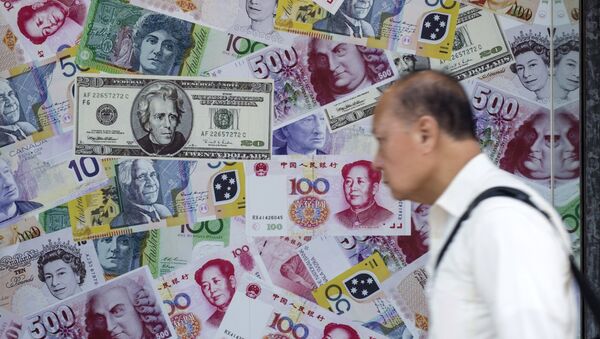Replying to reporters’ questions on the sidelines of an IMF and World bank meeting, Russian Finance Minister Anton Siluanov has pointed out that in view of the impact of US sanctions on the country’s sovereign debt market, Moscow has been creating the infrastructure to use the yuan and euro for loans.
Although there are fewer euro investors, Russia doesn’t have any issue about limitations on borrowing in the greenback, the finance minister asserted stressing Moscow would not issue dollar-denominated Eurobonds.
Russia’s budget for the upcoming year allows Moscow to reach up to $3 trillion in foreign borrowing, but the figure is naturally smaller if the foreign loans are euro-denominated, Siluanov noted.
Separately, in the foreseeable future, Russia is planning to issue the long-awaited “Panda” bonds, which are sovereign bonds issued in yuans, with the move due to allow Russia and its largest trade partner China to shrug off the economic pressure of sanctions and tariffs, a new round of which was slapped on Russia last month.
In late September, the US introduced sanctions against several Russian nationals, a few vessels and one entity, with the round becoming the 75th since 2011.
One of the earlier batches of limitations prohibited US banks from certain types of joint operations with regard to Russia's sovereign debt market and stipulated that Washington would strictly oppose any lending to Russia by international creditors.
One of the stumbling blocks has also been the US’s ruined trade ties with China, which Russia has maintained strong cooperation with. However, Siluanov noted in an interview with CNBC, Moscow would by no means cash in on the trade woes between Washington and Beijing.
In Gold Bullion We Trust
The finance chief shared that there is a way for Russia to combat drops in oil prices with the help of the country’s gold bullion. Admitting that the Russian economy is affected by low oil prices, since the former is "undoubtedly, to a large extent linked to oil production and refining", the finance minister went on to detail:
“Therefore, our challenge is to try and reduce our reliance on the global prices of energy resources. For these reasons, the budget is being based on budget rules that take into account an oil price of 42 dollars a barrel", he started off continuing that regardless of how things work out with oil prices, “we will be able to finance our obligations, because we have accumulated sufficient gold reserves – over 7 percent of GDP", Siluanov underscored.
He explained that even if oil prices drop to 30 or 20 dollars a barrel, the government would manage to fulfil its obligations for three years without any shocking damage to the budget.



